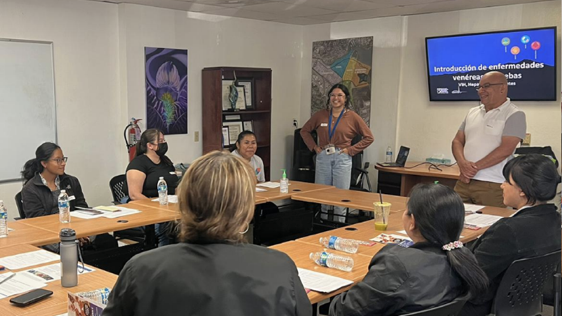
Primary.Health provided virtual bilingual training on our administration platform to community health workers participating in Marin County’s STI testing pilot. (Photo courtesy of Marin County Public Health.)
A yearlong California pilot powered by Primary.Health software demonstrates the potential of community-based approaches to STI testing and education.
Could community health workers (CHWs) in California improve access to screening and education in areas with the highest rates of sexually transmitted infections (STIs)?
That’s the question Marin County Public Health (MCPH) and partners, including Primary.Health, set out to answer in a yearlong pilot. In July 2023, MCPH launched an innovative program to address the rising rates of HIV, syphilis, and hepatitis C virus (HCV) in the community. This year-long initiative, concluding in June 2024, aimed to leverage CHWs and home-based testing to improve access to STI screening and education, particularly among underserved populations.
The program focused on two priority groups: Latino/a/x residents in San Rafael and African Americans in Marin City. These communities were chosen based on data showing higher STI rates in certain census tracts. The pilot set an ambitious goal of completing 200 home-based tests for HIV, syphilis, hepatitis C, and diabetes.
Core pilot components
Key aspects of the MCPH test program included:
- Partnerships: MCPH collaborated with Primary.Health and two community-based organizations (CBOs): Canal Alliance and Marin County Cooperation Team.
- Technology: The program utilized the Primary.Health platform for test registration, result delivery, and data analytics. Platform features included a dedicated landing page and resource hub for participants; options for participants to receive results electronically, verbally, or through a designee; and data analytics and customized dashboard for MCPH.
- Training: CHWs received comprehensive bilingual training from Primary.Health on using its testing platform. The CHWs were also trained in collecting blood samples, STI education, outreach techniques, and building rapport with community members.
- Outreach: CHWs and CBOs conducted field and social media outreach and door-to-door visits and participated in community events to engage residents.
- Home-based testing: Participants were offered self-test kits for HIV, syphilis, hepatitis C, and diabetes.
- Follow-up care: The program provided linkage to care for those who tested positive and resources for all participants.
Results and Impact
By the STI pilot’s midpoint, 80 people had been tested, with 182 tests administered. Notably, 46 percent of participants had never been tested for HIV, syphilis, HCV, or diabetes before, highlighting the program’s success in reaching underserved populations.
Outreach efforts were particularly impressive. Canal Alliance reported 3,545 interactions through social media posts, distribution of 660 flyers, and 1,960 face-to-face interactions. The Marin County Cooperation Team reached over 1,900 accounts on social media, distributed 3,201 flyers, and had 294 face-to-face interactions.
Pilot takeaway: Offering diabetes testing alongside STI screening can help to engage people in broader health discussions.
Successes and challenges
The program successfully built capacity within community organizations to provide STI education and testing and reached individuals not previously engaged in healthcare. The collaboration between public health and community partners helped to build trust and rapport with residents.
However, the pilot also faced challenges. Project startup took longer than expected due to the extensive training required. Lab turnaround times averaged 10 days, which was longer than ideal. Some technical issues with the platform and difficulties with proper blood sample collection were also reported.
Lessons learned
The STI pilot highlighted five key insights for future community-based STI testing programs:
- Community partnerships are essential for building trust and reaching priority populations.
- Meeting people “where they are” through field outreach and community events is critical.
- Offering diabetes testing alongside STI tests can be an effective way to engage people in broader health discussions.
- Comprehensive training for CHWs is crucial, especially for those new to STI outreach and education.
- Flexibility and adaptability are important when implementing new programs.
Looking ahead, program organizers recommend considering point-of-care rapid testing, ensuring consistent testing schedules, and partnering with healthcare providers who can bill for services to improve sustainability.
Put our platform to work in your community
Intrigued by our partnership with Marin County? Collaborate with Primary.Health! We help you deliver the basic health testing, vaccinations, preventive screenings, and telehealth your people need. Benefit from our platform’s program administration, registration, results delivery, and data analytics features, too. Bring the clinic to your community!
